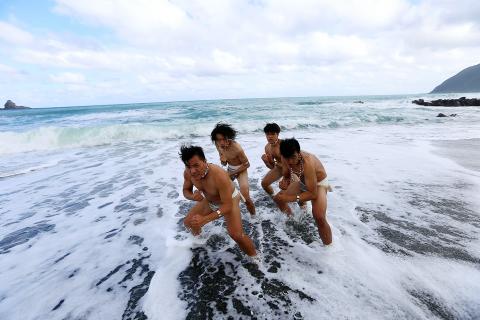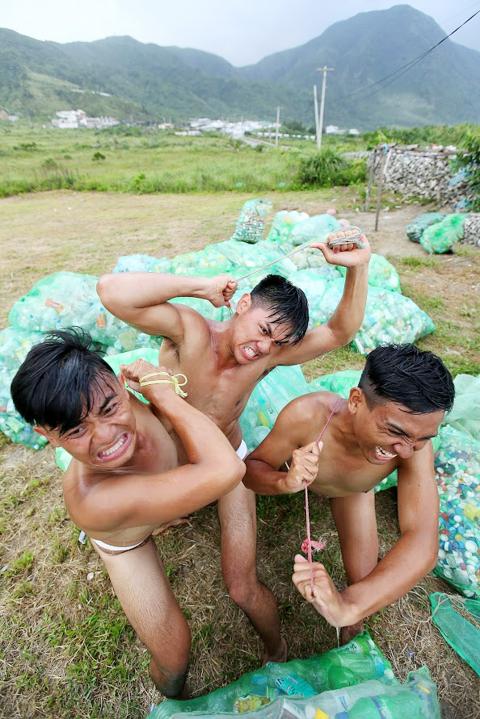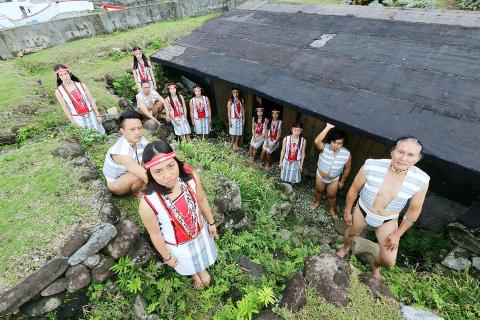The Formosa Indigenous Dance Foundation of Culture and Arts (原住民族樂舞劇) is celebrating its 25th anniversary with a new show, Maataw: the Floating Island (浮島), at the National Theater in Taipei this weekend, commissioned by the Council of Indigenous Peoples.
Well, technically. It is 25 years since the Formosa Aboriginal Song and Dance Troupe (原舞者) was founded — the name was changed to the foundation in 2001 to better reflect the diversity of its work and for management reasons.
The troupe, which was founded by a group of friends in Kaohsiung in 1991, relocated to Taipei’s Xindian District (新店) a year later and slowly began to develop a reputation for its research and reconstruction efforts to preserve the traditional songs and dances of Aboriginal communities, as well as for its performances. From the beginning, the company adopted an almost anthropological approach, with troupe members, sometimes joined by academics, visiting elders to learn a community’s language, songs, ceremonies and other traditions.

Photo courtesy of the Formosa Indigenous Dance Foundation of Culture and Arts
Based in Hualien since 2007, the troupe is made up of performers from several communities, including Amis, Bunun, Paiwan and one from the Tao. However, just because they are Aboriginals themselves, does not mean they have an easy time convincing members of other indigenous communities to share their traditions.
Maataw is the story of the Tao of Orchid Island (Lanyu, 蘭嶼). Not only is the production the first time the troupe has developed a show based on the Tao culture, it is the first time the story of the Tao is being presented in the National Theater.
For many in Taiwan, the Tao and Lanyu conjure up images of flying fish, men in loinclothes, bark breastplates and metal helmets — and Taiwan Power Co’s (Taipower) controversial dry cask nuclear waste storage facility.

Photo courtesy of the Formosa Indigenous Dance Foundation of Culture and Arts
Maataw director Fangas Nayaw said he made his first trip to Lanyu in January last year to do research, while other troupe members made the first of what would eventually be three trips in May.
The Tao culture is different from that of other indigenous communities in Taiwan, and there were a lot of sensitivities to surmount, both in terms of detailing their traditions — the songs “belong” to families in the community — and because of modern-day political issues, such as the long-running controversies surrounding the nuclear waste storage facility and the government’s promotion of Aboriginal culture and ceremonies as tourist attractions, which has made many Tao suspicious of dealing with outsiders. Tao elders were initially reluctant to teach their songs and dances to troupe members.
“Maataw” in the Tao language means “islands floating in the sea,” and is used to describe an image of the solidity of islands in the midst of ever-moving ocean waves.

Photo courtesy of the Formosa Indigenous Dance Foundation of Culture and Arts
Nayaw said the show has four acts and its storyline is based on traditional Tao ceremonies, but it also incorporated some of the issues facing the Tao today.
Act I begins with the way the Tao start the year — with the “calling of the fish.” This is followed by the annual fish festival and the harvest festival, which includes the “hair dance” by the women and a rice-pounding dance by the men. Then there is the “Mikariag,” or what Nayaw described as the “Tao’s karaoke,” which begins with hand clapping, then the first singer starts a song, followers join in and then the chorus chimes in. Traditionally, a “Mikariag” would begin about 9pm and continue until dawn, he said. The final act revolves around the naming ceremony, when the community elder gives a newborn his or her name.
The Tao are understandably unhappy that their home has become known for the nuclear waste site, which was built in 1982 without first consulting them and which has created a number of public health and policy problems.
A more recent issue is the government’s promotion of traditional Aboriginal festivals and ceremonies as a tourism draw for domestic and foreign tourists. Many of the tourists who attend such events, perhaps out of ignorance of the cultural significance and community sensitivities, are too intrusive when photographing and filming, or even worse, want to participate in the dances.
While this is an issue of increasing concern among Aboriginal communities around the nation, Nayaw said it is especially pressing for the Tao because Lanyu is so small.
“Outsiders coming to Lanyu are already too disturbing, going too close with their cameras, phones and selfie sticks. The Tao are calm, serious about their ceremonies, the outsiders are not,” he said.
He said he felt he had to walk a fine line in developing the show, respecting Tao culture when introducing it, but also letting people know about the problems that they face.
“My theater work combines the ceremonies of indigenous people into theater; it’s a combination of singing, dancing, acting,” said Nayaw, who has a bachelor’s degree from National Taiwan University and a master’s in fine arts from Taipei National University of the Arts. “But to do a theater production you have to change the point of view.”
“Theater has magical power, a fascination with different elements. Culture has to be told in theater — not in movies, not in photographs — we are dancing for you, telling a story, the stories are on our bodies,” he said.
Maataw is one of the larger theater shows the troupe has developed, with 30 performers, including Faidaw Fagod, the troupe’s artistic director. One of the reasons the Council of Indigenous Peoples came on as the producer is that it had the budget to do a big show.
Maataw runs 110 minutes, with a 15-minute intermission. A Chinese translation of the lyrics and dialogue is provided by screens on either side of the stage, while there is a brief English-language introduction to the show in the program.

A vaccine to fight dementia? It turns out there may already be one — shots that prevent painful shingles also appear to protect aging brains. A new study found shingles vaccination cut older adults’ risk of developing dementia over the next seven years by 20 percent. The research, published Wednesday in the journal Nature, is part of growing understanding about how many factors influence brain health as we age — and what we can do about it. “It’s a very robust finding,” said lead researcher Pascal Geldsetzer of Stanford University. And “women seem to benefit more,” important as they’re at higher risk of

Eric Finkelstein is a world record junkie. The American’s Guinness World Records include the largest flag mosaic made from table tennis balls, the longest table tennis serve and eating at the most Michelin-starred restaurants in 24 hours in New York. Many would probably share the opinion of Finkelstein’s sister when talking about his records: “You’re a lunatic.” But that’s not stopping him from his next big feat, and this time he is teaming up with his wife, Taiwanese native Jackie Cheng (鄭佳祺): visit and purchase a

Experts say that the devastating earthquake in Myanmar on Friday was likely the strongest to hit the country in decades, with disaster modeling suggesting thousands could be dead. Automatic assessments from the US Geological Survey (USGS) said the shallow 7.7-magnitude quake northwest of the central Myanmar city of Sagaing triggered a red alert for shaking-related fatalities and economic losses. “High casualties and extensive damage are probable and the disaster is likely widespread,” it said, locating the epicentre near the central Myanmar city of Mandalay, home to more than a million people. Myanmar’s ruling junta said on Saturday morning that the number killed had

Mother Nature gives and Mother Nature takes away. When it comes to scenic beauty, Hualien was dealt a winning hand. But one year ago today, a 7.2-magnitude earthquake wrecked the county’s number-one tourist attraction, Taroko Gorge in Taroko National Park. Then, in the second half of last year, two typhoons inflicted further damage and disruption. Not surprisingly, for Hualien’s tourist-focused businesses, the twelve months since the earthquake have been more than dismal. Among those who experienced a precipitous drop in customer count are Sofia Chiu (邱心怡) and Monica Lin (林宸伶), co-founders of Karenko Kitchen, which they describe as a space where they